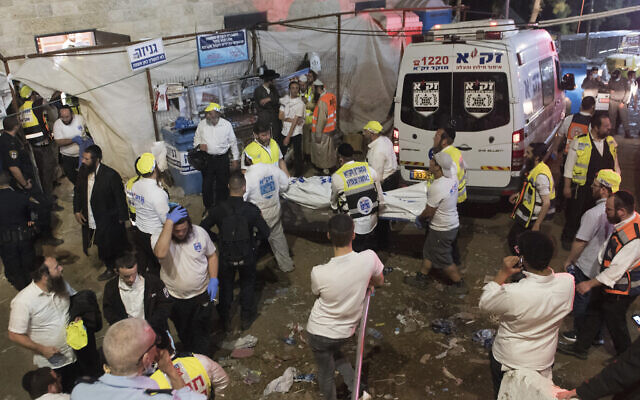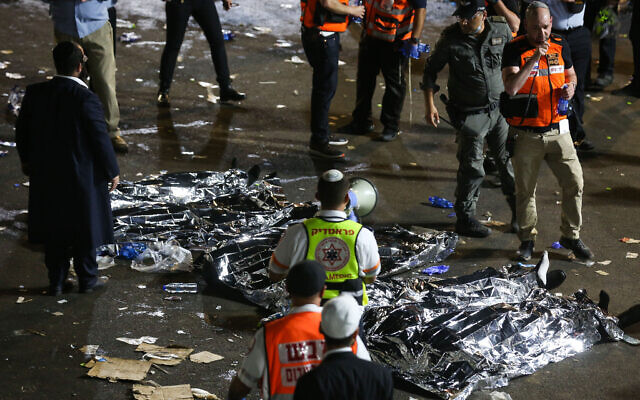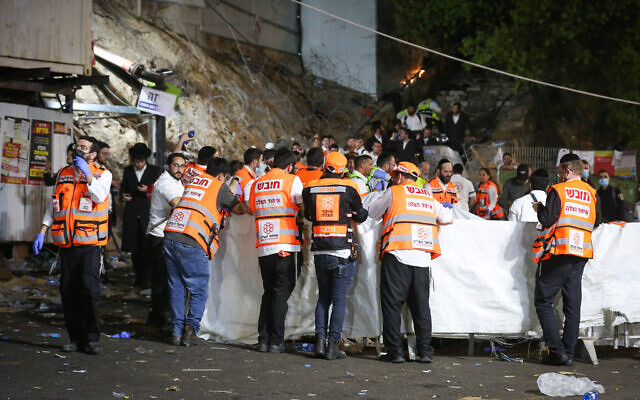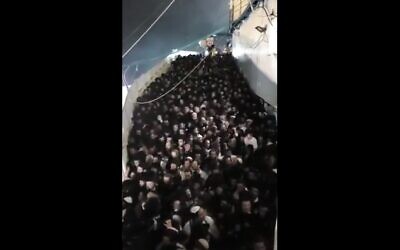‘The phones of the dead don’t stop ringing,’ says Zaka official, as families desperately try to find relatives missing after tragedy
By TOI STAFF
Today, 8:07 am
As families desperately tried to find relatives missing after the disaster at Meron, a spokesperson for the Zaka emergency services group said Friday that the cellphones of the deceased were ringing continuously with calls from frantic loved ones.
“The phones of the dead don’t stop ringing and we see [the calls are from] ‘mom’ and ‘my dear wife,’” Motti Bokchin told Army Radio.
“It’s unfathomable,” he added.

Israeli security officials and rescuers carry a body of a victim who died during Lag B’Omer celebrations at Mt. Meron in northern Israel, April 30, 2021 (AP Photo) The cellphone network in the area, not strong at the best of times, collapsed in the wake of the stampede, leaving worried family members unable to contact loved ones.
The situation was further complicated by the fact that many of the ultra-Orthodox participants in the event didn’t have cellphones, or had devices that were unable to send text messages or connect to the internet.
Some worried family members turned to social networks to post photos, desperately trying to find the missing.
Many of the families of the deceased have not yet been officially notified. Israelis were encouraged not to publicize information about the victims on social media until the families receive official word on the fate of their relatives.
Bokchin said he expected all the victims to be identified and buried before sundown of the Jewish Sabbath on Friday evening.
At least 44 people were crushed to death and more than 100 people hurt, including many in critical condition, in a stampede in the early hours of Friday morning at a mass gathering to celebrate the Lag B’Omer holiday at Mount Meron.

The injured and dead included children, Army Radio reported. Many families attended the gathering and in some streams of Judaism, 3-year-old boys receive their first haircuts at the event. Israeli rescue forces and police at a mass fatality scene during a gathering for the Jewish holiday of Lag B’Omer on Mt. Meron, in northern Israel, on April 30, 2021. (David Cohen/Flash90)
The disaster appeared to be one of the worst peacetime tragedies in Israel’s history, equaling the death toll from the 2010 Mount Carmel forest fire.
Worried relatives gathered at the Ziv hospital in Safed, the Galilee Medical Center in Nahariya, Rambam hospital in Haifa, Poriya hospital in Tiberias, and Hadassah Ein Kerem hospital in Jerusalem.

More than 100,000 people were attending the annual gathering in the northern Galilee, which includes visits to the gravesite of the second-century sage Rabbi Shimon Bar Yohai and massive bonfires on the mountainside.
A bonfire lighting ceremony for the Toldot Aharon Hassidic sect was being held at the pilgrimage area, close to Bar Yohai’s tomb. As the dense crowds began to exit, some apparently slipped on a walkway and down a flight of stairs, falling on those below and precipitating a stampede and fatal crushing.
Some 20,000 people streamed down a narrow walkway between two walls during the event. On the ground was slick metal flooring, which caused some people to fall underfoot during the rush for the exit.
Pictures from the scene showed bodies covered in blankets and bags as well as the personal effects and shoes of those trapped in the crush.
A Zaka emergency rescue officer speaking at the service’s field hospital at the site, told Channel 12 news that there was chaos at the site in the hours following the stampede, with parents separated from children.
He said Zaka was trying to gather all the children who have become separated from their parents at the Zaka facility, and bring them together.
“We are trying to locate people who are believed to be missing… to organize a register of names,” he said.
“There are more than 30 children here right now… whose mothers and fathers aren’t answering the phone.”
“Without getting graphic,” he said, “I’ve been with Zaka for decades. I’ve never seen anything like this… We don’t know exactly what happened, but the result is unthinkable.”
Zaka has a long history of dealing with tragedies, including collecting body parts from suicide bombings.
